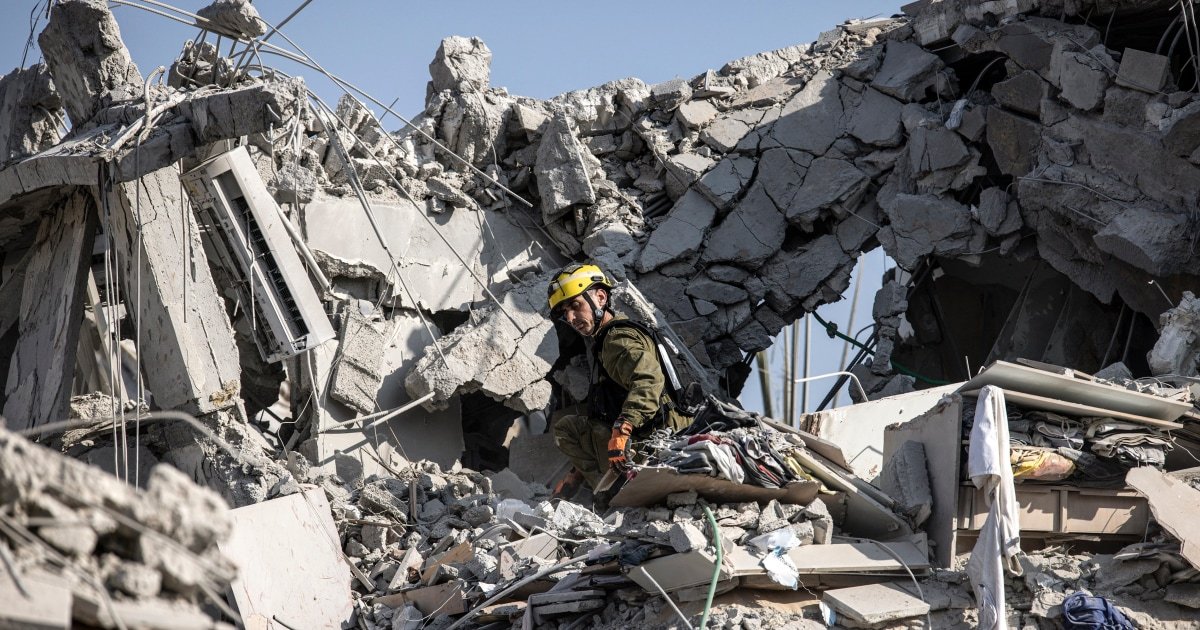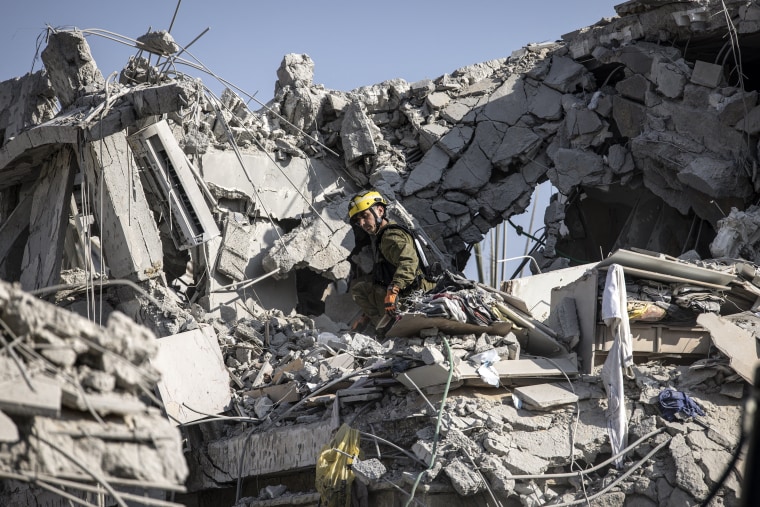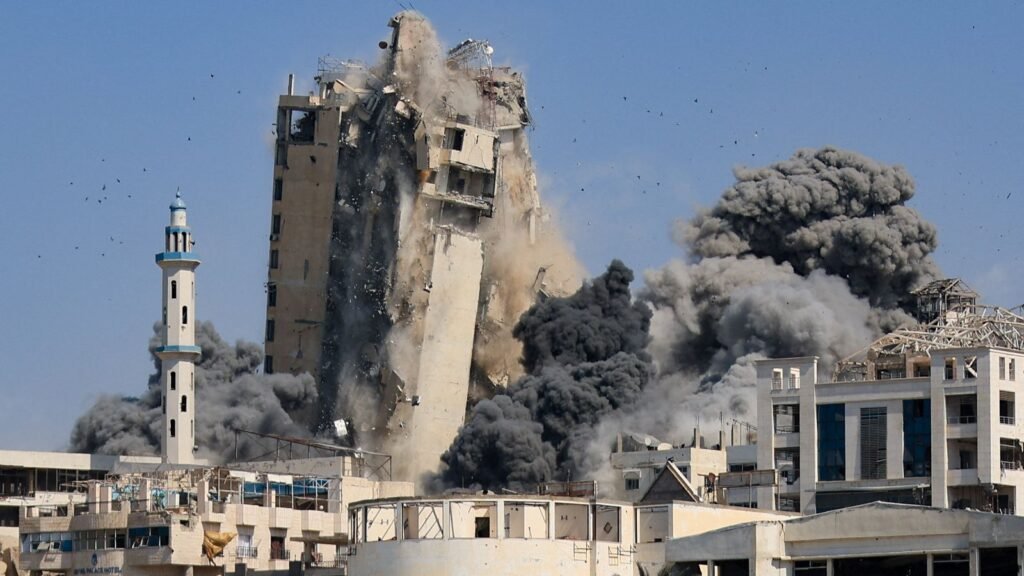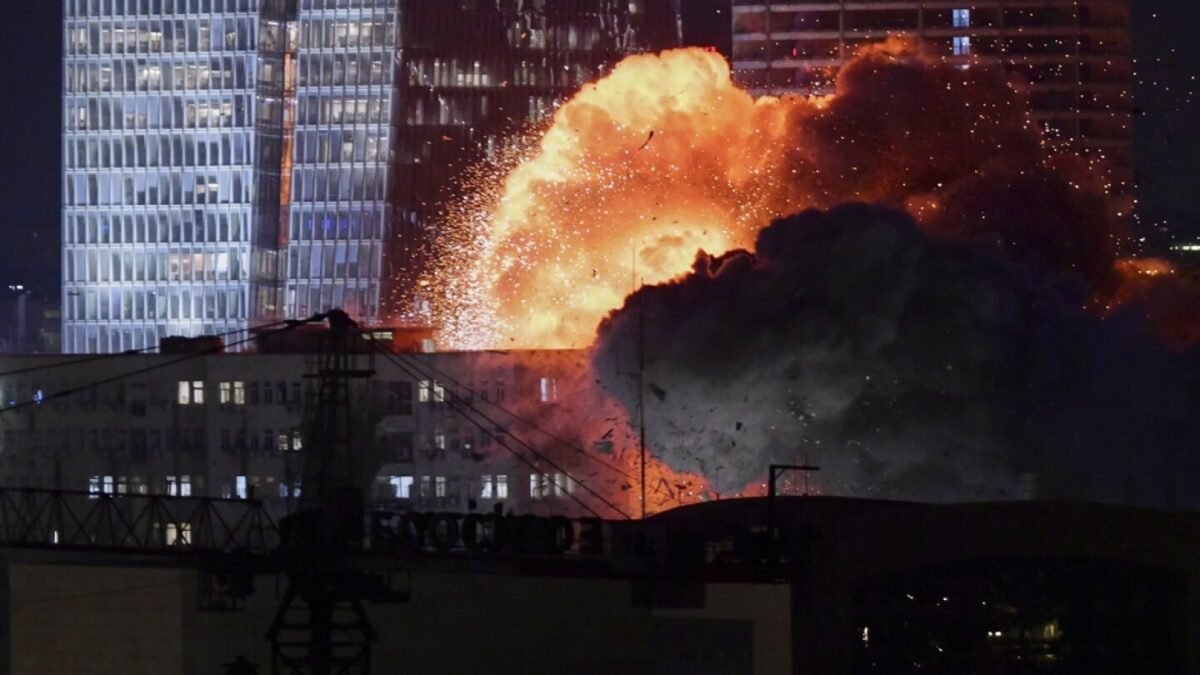Now Reading: Waves of airstrikes in Iran and Israel as exchange of fire enters second day
-
01
Waves of airstrikes in Iran and Israel as exchange of fire enters second day
Waves of airstrikes in Iran and Israel as exchange of fire enters second day

Iran tells U.S., U.K. and France that Israel’s allies under threat
Reporting from Tehran, Iran
Iran has informed the U.S., France and the U.K. that it will attack the bases of countries supporting Israel, including by intercepting Iranian strikes on Israel, according to Iranian state media.
IRINN reported today that “any country that assists in intercepting Iranian strikes on Israel will be considered a co-belligerent, and all its regional bases, including military installations in the Persian Gulf states, as well as naval vessels in the Persian Gulf and Red Sea, will be targeted by Iranian forces.”
Earlier today, Farsnews, an Iranian news agency affiliated with the Islamic Revolutionary Guard Corps, said Iranian attacks will spread across “all occupied lands” and American bases in the region.
Israel killed three nuclear scientists in strikes, Iran state media says
Israel killed three nuclear scientists during its attacks on the country, Iranian state media reported today.
The scientists were identified as Ali Bakaei Karimi, Mansour Asgari and Saeid Borji.
Earlier today, the IDF said that it had killed nine “senior scientists and experts in the Iranian nuclear project.”
The IDF list included the names of the three men reported dead by state media.
Trump monitoring tensions between Iran and Israel
A White House official tells NBC News that President Donald Trump will be monitoring the situation between Israel and Iran and developments across the Middle East all day before going to the military parade this evening.
Iran says nuclear talks with U.S. are cancelled
A spokesperson for Iran’s Ministry of Foreign Affairs says talks between the U.S. and Iran that were scheduled for Sunday have been cancelled, following Israel’s attack on the country yesterday.
The two nations were set to meet in Muscat, Oman, for a sixth round of talks over Tehran’s nuclear program.
“The United States has supported the Zionist regime’s aggression, including the targeting of Iran’s peaceful nuclear facilities,” Esmaeil Baghaei said Saturday, according to Iranian state media Mehr News.
“Participating in talks with a party that is the principal supporter and accomplice of the aggressor is fundamentally meaningless.”
The U.S. has not confirmed whether or not the talks are set to go ahead.
Iranian regime may struggle to recover, but could decide to push for bomb, experts say
Israel’s military strikes on Iran have struck at the heart of the country’s military leadership and nuclear program, creating a possible vacuum at the top of the regime that could hinder its ability to recover from the onslaught, experts say.
But — assuming that it still can — there is a scenario in which the strikes could lead Tehran to abandon negotiations over its nuclear program and instead rush toward building a bomb, according to analysts and former U.S. officials.
The killing of top Iranian military officers as well as several nuclear scientists will likely have sparked fears in Tehran that Israeli intelligence had deeply penetrated the regime and that other senior figures could also be in danger.
Israel has previously pulled off brazen assassinations inside Iran, targeting senior government scientists involved in the country’s nuclear program and the political leader of the Iranian-backed Palestinian group Hamas when he was visiting Tehran.
Read full story.
Nuclear facility shows no increase in off-site radiation, says atomic agency
Iran’s Esfahan nuclear facilities have shown no increase in off-site radiation levels after they were targeted by Israeli air strikes yesterday, according to the International Atomic Agency.
The Israeli military launched a blistering attack on Iran’s nuclear and army sites, killing some of the country’s top military leaders and senior scientists. Israel said it had struck the nuclear research facility in Esfahan, as well as Iran’s main nuclear enrichment facility in Natanz.
“The IAEA remains in close contact with Iran,” it said in a post on X.
U.N. nuclear chief Rafael Grossi told the Security Council that the above-ground section of the Natanz facility was destroyed, but the main centrifuge facility underground did not appear to have been hit, according to the Associated Press.
The attacks have cast doubt on a sixth round of talks between the U.S. and Iran on Sunday. On Friday, Iran’s Foreign Ministry called the discussions “meaningless” after earlier accusing the U.S. of complicity in the attacks.
Iran’s nuclear program damaged but not destroyed, Israeli military official said
Israel’s first assessments are emerging. It believes Iran’s nuclear program has been badly damaged. It is not destroyed.
“Our initial assessment is that we have been able to damage both Isfahan and Natanz” nuclear sites, an Israeli military official said this morning. Natanz nuclear complex is Iran’s main uranium enrichment facility, and the official said the damage there is “significant.”
“According to our initial understanding and what we have seen from our operations it will take much more than a few weeks to repair what happened in Natanz and Isfahan,” the official said.
Yesterday, the U.N. nuclear watchdog chief Rafael Grossi told the Security Council that a Natanz enrichment site had been destroyed along with it’s electricity infrastructure. He also said centrifuges may have been damaged. Israel also says it has killed 9 senior nuclear researchers, who were driving forward Iran’s nuclear program.
But the Israeli military official said another nuclear site, Fordow, which has an enrichment plant buried deep underground, has not yet been struck. Before this Israeli campaign experts believed that the only way to destroy Fordow was with a massive ordnance penetrator that only America has: a 30,000 pound bomb that would be dropped from a B-2 bomber.
Asked by NBC News whether Fordow could be destroyed without U.S. assistance the Israeli official said, “I don’t want to go into specifics about what that would look like, if we did” target Fordow, “I want to leave that unanswered at the moment.”
The Associated Press reported earlier today that Israel had appeared to strike Fordow, citing an Iranian news outlet close to the government that reported hearing explosions nearby.
Pope Leo XIV calls for peace between Israel and Iran
Pope Leo XIV has appealed for peace between Israel and Iran, urging its leaders to seek de-escalation through diplomacy and respect.
“The commitment to building a safer world, free from the nuclear threat, must be pursued through respectful encounters and sincere dialogue to build a lasting peace, founded on justice, fraternity, and the common good,” he said in a statement.
“No one should ever threaten another’s existence. It is the duty of all countries to support the cause of peace, initiating paths of reconciliation and promoting solutions that guarantee security and dignity for all.”
‘Difficult days’ ahead for Israel, but attack was an ‘existential necessity,’ says IDF
An Israeli military official said “difficult days” lie ahead for Israel, but that the country attacked Iran through “existential necessity.”
The Israeli military launched a massive attack on Iran on Friday in a dramatic escalation of their long-running conflict that drew retaliatory missile assaults from Tehran and raised the risk of another war in the Middle East.
“We understood when we entered this operation that it might be difficult, that there are difficult days ahead of us, complex days ahead of us, why we woke up the Israeli population and gave them warnings and time to rearrange their safe room and and get ready, because we understand who we’re facing,” the official said this morning.
The official also denied Iranian reports that they had downed Israeli planes and taken an Israeli pilot hostage, saying all jets had returned safely.
“Last night and this morning, all aircrafts and all pilots and members of the plane, co pilots, navigators, whatever be, all returned safely,” he said.
Two more high-ranking generals killed by Israeli strikes, says Iran
Reporting from Tehran, Iran
Iran has confirmed that two more high-ranking generals have been killed by Israeli strikes.
Sardar Sarshakar Pasdar Mehdi Rabbani, Deputy Chief of Operations of the Armed Forces, and Sardar Sarshakar Gholamreza Mehrabi, Deputy Intelligence Chief of Staff of the Armed Forces, were announced dead today.
Yesterday, Iran announced the death of six other senior military officials.
‘Tehran will burn’ if Iran keeps firing missiles, Israeli defense minister says
Israeli Defense Minister Israel Katz said Saturday that Iran’s capital city Tehran “will burn” if the country continues to strike Israel with missiles.
In a statement addressing Iran’s Supreme Leader Ayatollah Ali Khamenei, Katz said Iranian citizens “and in particular the residents of Tehran, will pay a heavy price for the criminal harm to the citizens of Israel.”
“If Khamenei continues to fire missiles at the Israeli home front,” Katz added. “Tehran will burn.”
Iran says talks with U.S. ‘meaningless’ after Israel attack, but yet to decide on attending
Iran said the dialogue with the U.S. over Tehran’s nuclear program is “meaningless,” but said it is yet to decide on whether to attend planned talks on Sunday.
“The other side (the U.S.) acted in a way that makes dialogue meaningless. You cannot claim to negotiate and at the same time divide work by allowing the Zionist regime (Israel) to target Iran’s territory,” state media on Saturday quoted foreign ministry spokesperson Esmaeil Baghaei as saying.
“It is still unclear what decision we will make on Sunday in this regard.”
Iran earlier accused the U.S. of being complicit in Israel’s attacks, but Washington denied the allegation. President Trump told Reuters that he and his team had known the Israeli attacks were coming but they still saw room for an accord.
How Israel’s Iran strikes might open ‘Pandora’s box’ for the region — and the U.S.
Iran had no choice but to retaliate against Israel’s sweeping strikes on its nuclear facilities and targeted killings of senior officials, experts of the region said Friday, risking an escalation that could drag the United States into a spiraling conflict.
Late on Friday, loud blasts were heard throughout Israel and the public was told to take shelter after the military said it identified missiles being launched from Iran. Iran launched “hundreds of ballistic missiles,” Iran’s Islamic Republic News Agency reported, adding that “the hard retaliation has begun.”
While not a surprise, Israel’s earlier attack was remarkable in its severity, with some 200 Israeli fighter jets hitting one of Iran’s main uranium enrichment sites; striking the capital, Tehran; and killing many top military leaders. Israeli Prime Minister Benjamin Netanyahu has vowed more was to come.
This left the Islamic Republic with few options, having been weakened by a succession of Israeli strikes over the past year, experts warn.
Read full story.
Israeli strike on a defense ministry residence in Tehran kill 60
Reporting from Tehran, Iran
Israeli strikes on Shahid Chamran residential complex in Tehran today have killed an estimated 60 people, 20 of them children, according to a TV report on IRNN, Iran’s state-run news agency.
The 14-floor building in Nobonyad Square, north Tehran, is a residential complex for the defense ministry.
Israeli strikes have killed at least 130 people in Tehran, after 78 people were killed yesterday, according to state media reports. Other cities have also reported casualties. No official numbers have been released.
Explosions ongoing in northern Iran
Reporting from Tehran, Iran
Another round of loud explosions are currently being heard in Tabriz.
Iran says it will attack U.S. bases in the region
Reporting from Tehran, Iran
Iranian attacks will spread across “all occupied lands” and American bases in the region, according to Farsnews, an Iranian news agency affiliated with the Islamic Revolutionary Guard Corp.
It said the attacks would extend over the next few days, and “will be regretful and painful for the aggressors.”
Iran strikes kill 3 in Israel
Iran’s retaliatory strikes on Israel have killed at least three people from Friday into Saturday morning.
A woman and a man were killed by strikes near homes in the city of Rishon in central Israel, according to the the nation’s Magen David Adom emergency services.
A spokesperson from Beilinson Hospital said a woman that was injured critically yesterday was pronounced dead this morning.
Iran’s U.N. ambassador said 78 people were killed and more than 320 wounded by Israeli strikes.
Rescue efforts continue as strikes hit central Israel
Across central Israel, Iranian missiles have killed three people, damaged homes and injured dozens as strikes continued through Friday night into Saturday morning.

Sheba hospital said 68 people were treated fior various shrapnel injuries and anxiety. Beilinson hospital said 19 injured people had been admitted so far, including seven in light to moderate condition from this morning’s latest barrage of missiles.
Israel’s fire and rescue services said it operated at dozens of sites overnight responding to burning buildings, and Israel’s emergency services Magen David Adom posted pictures on social media of buildings that had collapsed, with paramedics treating people in serious and critical condition
Civilian life is under heavy disruption, with transport hubs closed, including Ben Gurion international airport, and public events suspended. The IDF and MDA have asked Israelis to remain near shelters.
Israel attacked Tehran’s Mehrabad airport overnight
Israel launched an overnight strike on Tehran’s Mehrabad airport, targeting a hangar housing fighting jets, according to Iran’s state media.
The report said a fighter jet base had been hit, but that the runway and main buildings were still intact.
U.S. ambassador to Israel Huckabee said he had to shelter 5 times
The United States’ ambassador to Israel Mike Huckabee said this morning local time that he has had to shelter five times overnight as Iran has launched missiles at Israel in response to Israel’s attack on the country.
“Been rough nite in Israel. Had to head to shelter 5 times during the nite. It’s now Shabbat here. Should be quiet. Probably won’t be. Entire nation under orders to stay near shelter,” Huckabee wrote on X.
21 reported injured, one critically, in rocket strike in Israel
A rocket strike in Israel has injured 21 people, one of whom was in critical condition and several others in serious condition, the Israeli paramedic organization Magen David Adom said. The explosion was in Rishon Lezion.
“Update to rocket strike site in Coastal plain: MDA EMTs and paramedics treating and evacuating 21 patients, one in critical condition, several seriously injured and others in mild to moderate condition,” it said on X.
Initially, 13 had been reported injured while searches were ongoing, and at that time a post on X by Magen David Adom showed showed a collapsed building and other damage. The number of injured was later updated to 21.
UN secretary-general says ‘enough escalation’
UN Secretary-General António Guterres today again called for an end to the escalation after Israel struck Iran with airstrikes and Iran responded with barrages of missiles.
“Enough escalation. Time to stop,” he wrote on X. “Peace and diplomacy must prevail.”


























































